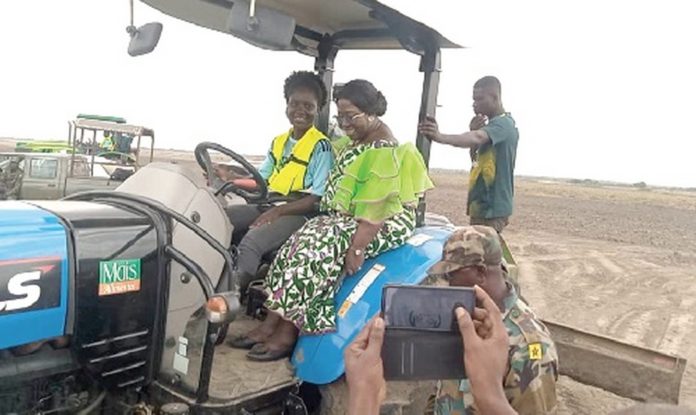An Economic Enclave Project (EEP) to provide land for the cultivation of rice and vegetables has been launched at Kasunya-Teteman in the Shai Osudoku District in the Greater Accra Region.
The initiative, under the Ghana COVID-19 Alleviation and Revitalisation of Enterprises Support (Ghana CARES) ‘Obaatanpa’ programme, seeks to expand the production of rice, maize, vegetables and poultry.
In line with that, 20,000-acre land has been made available at the Noyaa Akutso economic enclave in the Kasunya – Nyaphienya area.
The initiative is being led and coordinated by the Millennium Development Authority (MiDA), in collaboration with the Ministry of Food and Agriculture, the Ministry of Energy, the Ghana Irrigation Development Authority, the 48 Engineers Regiment of the Ghana Armed Forces, the National Entrepreneurial and Innovation Programme, the MasterCard Foundation and the National Service Secretariat.
A pilot phase of the project has commenced with the cultivation of 1,000 acres of rice by a private sector operator, Agrokings, in partnership with the 48 Engineers Regiment where more than 150 young farmhands have been engaged.
Impact of COVID-19
The Chief of Staff, Akosua Frema Osei-Opare, who launched the project last Friday, said the outbreak of the COVID-19 pandemic had interrupted the pursuit of economic transformation by the government.
As a result, she said, the economy had been severely challenged, resulting in the prevailing difficulties people were facing in the country.
According to her, at the start of the crisis in April 2020, the President observed that the country could take advantage of the crisis to transform the economy for which he challenged ministers to leverage the opportunity provided by the pandemic and build a wealthy, inclusive, sustainable, empowered and resilient country.
“I am excited that we are taking real and substantive steps to change how we produce and consume goods in the country,” she said.
Mrs Osei-Opare described the project as an innovative one that would create a viable ecosystem for commercial agriculture to significantly grow the sector.
She said the project would be replicated in different regions, including Western, Oti, Western North, Savanna and Central to cultivate a total of about 110,000 acres of land.
Growth enhancing initiatives
The Minister of Finance, Ken Ofori-Atta, also said that prior to the disruptive impact of COVID-19, there was renewed hope for the country’s transformation with a strong macro-economic performance, including some measures to facilitate inclusive growth-enhancing initiatives.
He said the government had to redouble its efforts, work efficiently and expand partnerships to drastically reduce the import bill, which exceeded $10b annually.
Again, the minister said there was the need to domesticate items that accounted for about 45 per cent of the value of annual imports of products such as rice, poultry, pharmaceuticals, jute bags, fish and sugar, and also reduce the $1b spent to import rice between 2017 and 2021, while expanding the rice self-sufficiency ratio which was around 43 per cent as of 2020.
Mr Ofori-Atta further called for ingenious ways to quadruple the output of poultry production to meet the national demand of 400,000 tonnes and reverse the trend which had seen domestic production of chicken decline from 58 per cent in 2000 to 20 per cent in 2021.
Importation of tomato from neighbouring countries which stood at 90 per cent, and estimated to reach $400m in October 2022, must also be reduced.
He further said that the EEP would focus on promoting competitive food import substitution which would initially target rice, poultry and maize through commercial and large-scale farming.
Entrepreneurship
The CEO of MiDA, Martin Eson-Benjamin, said under the project, efforts would be made to encourage the private sector to engage more youth in rice, tomato, onion, maize, as well as poultry production.
The Minister of Defence, Dominic Ntiwul, commended the project implementors for including the 48 Engineer Regiment on the EEP, adding that it was a testament to the regiment’s commitment and professionalism to national development.
The Regent of Kusunya-Teteman, Numo Moses Otu Tettey Akakposu, expressed appreciation to the government for extending development to the area and pledged the support of the people in ensuring the successful implementation of the project.
Dr Okoh explained that the new edifice was going to increase the number of emergency cases they could take in the hospital as it was going to double what they used to take previously as a facility.

